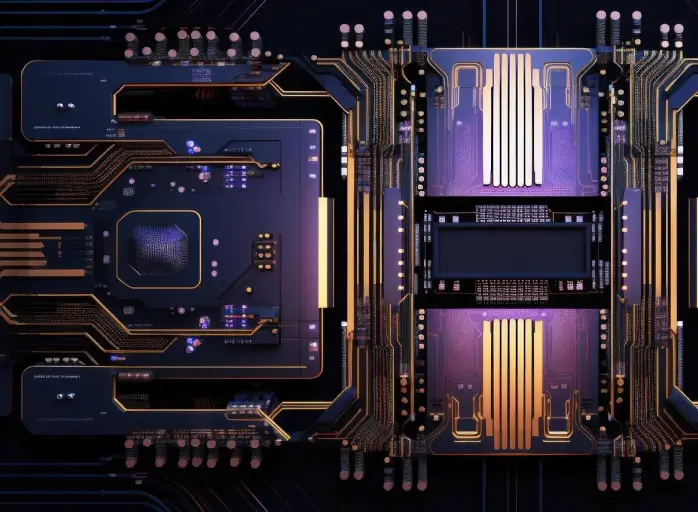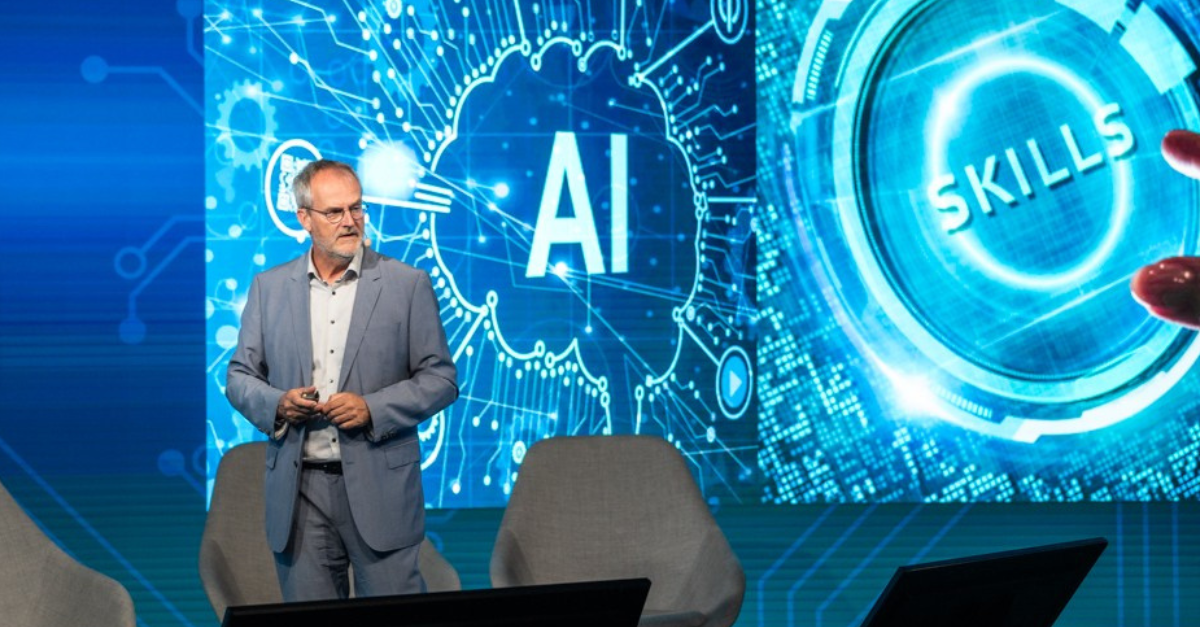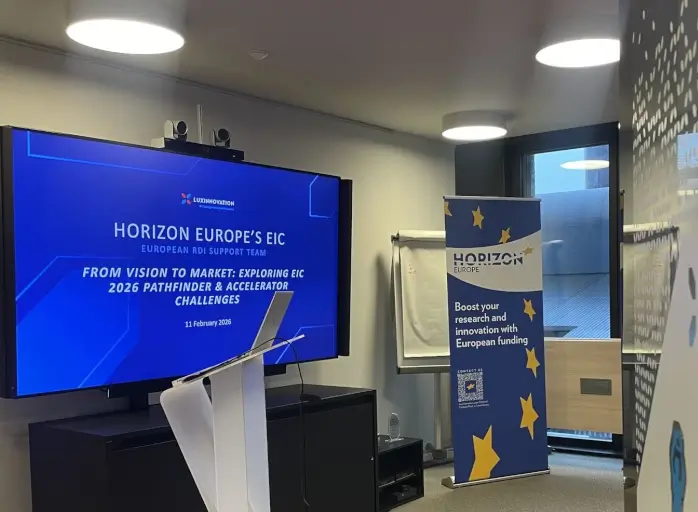

Supercomputers: Engines of innovation for multiple sectors
How are companies and researchers leveraging supercomputers for innovation? The 2024 Supercomputing Day provided a platform to explore the use of these powerful machines.
 Abigail Okorodus
Abigail Okorodus
04/07/2024
“Data is the new oil. We've heard that many times. But only recently have we found the proper car, called artificial intelligence, to use that oil. Today, we’ll show you the factory that builds this vehicle: the supercomputer,” stated Ralf Hustadt, Special Advisor for Digitalisation, Data Economy, and Gaia X at Luxinnovation.
Beyond training AI models, supercomputers are pushing the boundaries in various industries. These high-performance computers can process vast amounts of data at unprecedented speeds, making them indispensable from scientific research to finance and the startup world.
Europe has made significant progress in providing easy access to supercomputing resources for companies, researchers and public administrations. The European High Performance Computing Joint Undertaking (EuroHPC JU), based in Luxembourg, was founded in 2018 to make the continent a global leader in supercomputing. It combines resources from the EU, 32 European countries and three private partners, and has procured nine supercomputers spread across Europe, including Luxembourg’s MeluXina.
“From 1998 to the present day, Europe has become an increasingly important player,” emphasised Arnaud Lambert, CEO of LuxProvide. In June 2024, four European supercomputers (Lumi, Alps, Leonardo and MareNostrum 5) were in the top 10 of the Top500 list. “With all its computing power, we are now definitely competing with the United States,” asserted Josephine Wood, Head of Unit, Strategy and Governance at EuroHPC.
Banks have used supercomputing for decades to perform complex calculations with big data sets and to execute sophisticated models for issues like fraud detection, risk management and anti-money laundering. “What's new today is the advancement of AI,” noted Filipe Pais, Chief Customer Success Officer at LuxProvide.
Ananda Kautz, a member of the Management Board at the Luxembourg Bankers' Association (ABBL) with 15 years of experience in the financial sector, discussed results from a recent survey on generative AI adoption in finance. “Around 90% of institutions see generative AI as an opportunity, and 80% are either implementing or planning to implement it in the coming months,” she stated. Use cases include chatbots, translations, documentation improvements and developing personalised services.
Ajay Bali, EY Luxembourg Technology Consulting Partner, emphasised the growing AI demand in insurance and banking. “Once we have these business use cases, the next question is ensuring data privacy. Gen AI needs data that must first be validated with customers,” he said. He also stressed the need to set up “guardrails” and monitor risks progressively to avoid biases.
Supercomputing resources in Luxembourg are also available to startups. Various players in its supportive ecosystem explained how they support young entities in this area. “Data, AI and high-performance computing (HPC) are extremely important, and Luxembourg is very well positioned. One element is our infrastructure, and the other is that our startup ecosystem has evolved significantly over the last 10 years, making us a hub for early-stage and technology startups,” noted Michele Gallo, Director Digital Technologies and Start-up at the Ministry of the Economy.
Sven Baltes, Manager of Start-Up Relations at Luxinnovation, highlighted startup acceleration programmes like Fit 4 Start. Additionally, LuxProvide, with the Ministry of the Economy's support, launched two new programmes: “Initiate” for early-stage startups to develop prototypes and “Cashback 80%” for scaling startups to access significant supercomputing resources.
“Our relationship with LuxProvide allows us to better support the companies that participate in the healthtech, digital or space verticals of Fit 4 Start. In the just concluded edition 14, several of the companies have started collaborative projects with LuxProvide,” indicated Mr Baltes.
Companies incubated at the House of Startups are currently working with MeluXina. Examples include space cleantech startup WEO, American-Luxembourg climate tech company Hydrosat, and Databourg, a spin-off of the University of Luxembourg's Interdisciplinary Centre for Security, Reliability, and Trust (SnT).
“We see many space and cleantech startups needing HPC solutions,” pointed out Philippe Linster, CEO of the House of Startups. While some use HPC for satellite imagery analysis, others like HR tech company Zortify leverage MeluXina to train AI models. “HPC can also be very interesting for other fields. We also introduce corporates within our network to MeluXina,” Mr Linster added.
Michael Martin, Managing Partner at Aravis Advisors, explained that his company has developed two software solutions with HPC and benefitted from both of LuxProvide’s programmes. It uses MeluXina to simulate and manage complex forestry ecosystems and to analyse satellite images that identify suitable areas for institutional investors.
“We’ve been working with MeluXina for quite some time. We participated in its early access programme, and we are also working on a local project within a European consortium to demonstrate the use of HPC to accelerate Earth observation-based applications,” explained Albert Abelló, Director of Engineering at Hydrosat. “We've used the supercomputer to advance our scientific research or to shorten our R&D cycles. I do see a path in the near future to use MeluXina for operational services,” he continued.
Guy Schumann, CEO & Founder of RSS-Hydro, one of the first graduates of the HPC vertical in Fit 4 Start #12, mentioned that the biggest advantage of using MeluXina is its high security level and green infrastructure. “We use space data and computer models for disaster response, flood risks analysis and more. Simulations require a lot of computing power, which is where MeluXina comes in,” he pointed out.
The company also uses the national supercomputer for flood mapping from space using machine learning to detect floods from various types of imagery. “This process requires big data and training. We have a European project starting with LuxProvide to address our training bottleneck,” he added. Another use case involves a student challenge to build a foundation model for faster machine learning. “We use terabytes of satellite data to train an AI model, requiring significant computing power, and here we also collaborate with LuxProvide.”
As quantum computing begins to gain popularity, Ms Wood added that Europe aims to “procure various systems to allow scientists and companies continue to experiment, test, and explore their potential”.
Beyond training AI models, supercomputers are pushing the boundaries in various industries. These high-performance computers can process vast amounts of data at unprecedented speeds, making them indispensable from scientific research to finance and the startup world.
A strong European positioning
Europe has made significant progress in providing easy access to supercomputing resources for companies, researchers and public administrations. The European High Performance Computing Joint Undertaking (EuroHPC JU), based in Luxembourg, was founded in 2018 to make the continent a global leader in supercomputing. It combines resources from the EU, 32 European countries and three private partners, and has procured nine supercomputers spread across Europe, including Luxembourg’s MeluXina.
“From 1998 to the present day, Europe has become an increasingly important player,” emphasised Arnaud Lambert, CEO of LuxProvide. In June 2024, four European supercomputers (Lumi, Alps, Leonardo and MareNostrum 5) were in the top 10 of the Top500 list. “With all its computing power, we are now definitely competing with the United States,” asserted Josephine Wood, Head of Unit, Strategy and Governance at EuroHPC.
Applications in finance driven by AI
Banks have used supercomputing for decades to perform complex calculations with big data sets and to execute sophisticated models for issues like fraud detection, risk management and anti-money laundering. “What's new today is the advancement of AI,” noted Filipe Pais, Chief Customer Success Officer at LuxProvide.
Ananda Kautz, a member of the Management Board at the Luxembourg Bankers' Association (ABBL) with 15 years of experience in the financial sector, discussed results from a recent survey on generative AI adoption in finance. “Around 90% of institutions see generative AI as an opportunity, and 80% are either implementing or planning to implement it in the coming months,” she stated. Use cases include chatbots, translations, documentation improvements and developing personalised services.
Ajay Bali, EY Luxembourg Technology Consulting Partner, emphasised the growing AI demand in insurance and banking. “Once we have these business use cases, the next question is ensuring data privacy. Gen AI needs data that must first be validated with customers,” he said. He also stressed the need to set up “guardrails” and monitor risks progressively to avoid biases.
Ecosystem support for startups
Supercomputing resources in Luxembourg are also available to startups. Various players in its supportive ecosystem explained how they support young entities in this area. “Data, AI and high-performance computing (HPC) are extremely important, and Luxembourg is very well positioned. One element is our infrastructure, and the other is that our startup ecosystem has evolved significantly over the last 10 years, making us a hub for early-stage and technology startups,” noted Michele Gallo, Director Digital Technologies and Start-up at the Ministry of the Economy.
Sven Baltes, Manager of Start-Up Relations at Luxinnovation, highlighted startup acceleration programmes like Fit 4 Start. Additionally, LuxProvide, with the Ministry of the Economy's support, launched two new programmes: “Initiate” for early-stage startups to develop prototypes and “Cashback 80%” for scaling startups to access significant supercomputing resources.
“Our relationship with LuxProvide allows us to better support the companies that participate in the healthtech, digital or space verticals of Fit 4 Start. In the just concluded edition 14, several of the companies have started collaborative projects with LuxProvide,” indicated Mr Baltes.
HPC applications in the startup world
Companies incubated at the House of Startups are currently working with MeluXina. Examples include space cleantech startup WEO, American-Luxembourg climate tech company Hydrosat, and Databourg, a spin-off of the University of Luxembourg's Interdisciplinary Centre for Security, Reliability, and Trust (SnT).
“We see many space and cleantech startups needing HPC solutions,” pointed out Philippe Linster, CEO of the House of Startups. While some use HPC for satellite imagery analysis, others like HR tech company Zortify leverage MeluXina to train AI models. “HPC can also be very interesting for other fields. We also introduce corporates within our network to MeluXina,” Mr Linster added.
Michael Martin, Managing Partner at Aravis Advisors, explained that his company has developed two software solutions with HPC and benefitted from both of LuxProvide’s programmes. It uses MeluXina to simulate and manage complex forestry ecosystems and to analyse satellite images that identify suitable areas for institutional investors.
Space applications and biggest MeluXina advantages
“We’ve been working with MeluXina for quite some time. We participated in its early access programme, and we are also working on a local project within a European consortium to demonstrate the use of HPC to accelerate Earth observation-based applications,” explained Albert Abelló, Director of Engineering at Hydrosat. “We've used the supercomputer to advance our scientific research or to shorten our R&D cycles. I do see a path in the near future to use MeluXina for operational services,” he continued.
Guy Schumann, CEO & Founder of RSS-Hydro, one of the first graduates of the HPC vertical in Fit 4 Start #12, mentioned that the biggest advantage of using MeluXina is its high security level and green infrastructure. “We use space data and computer models for disaster response, flood risks analysis and more. Simulations require a lot of computing power, which is where MeluXina comes in,” he pointed out.
The company also uses the national supercomputer for flood mapping from space using machine learning to detect floods from various types of imagery. “This process requires big data and training. We have a European project starting with LuxProvide to address our training bottleneck,” he added. Another use case involves a student challenge to build a foundation model for faster machine learning. “We use terabytes of satellite data to train an AI model, requiring significant computing power, and here we also collaborate with LuxProvide.”
As quantum computing begins to gain popularity, Ms Wood added that Europe aims to “procure various systems to allow scientists and companies continue to experiment, test, and explore their potential”.







